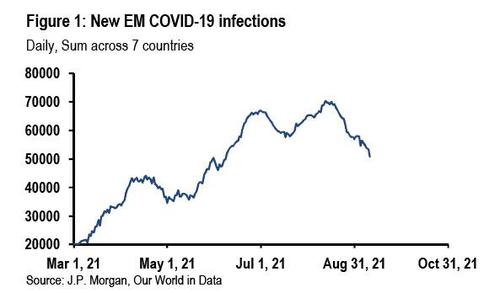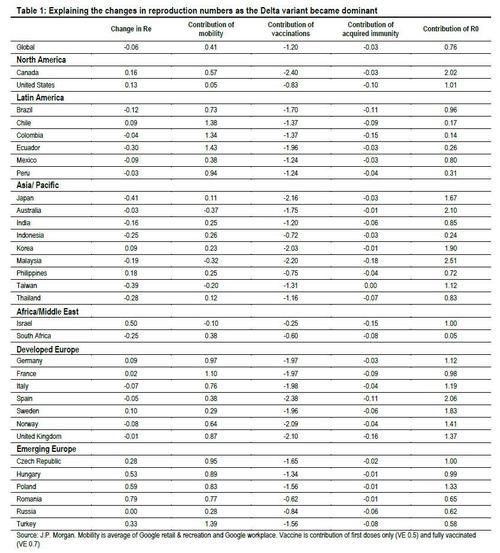Now that the Delta variant in the US has peaked in terms of new cases, hospitalizations and deaths, media fearmongering surrounding the latest round of the covid pandemic has understandably been quietly pulled from the front pages at least until such time the mu variant, or some other virulent strain du jour, makes a triumphant appearance and Fauci is again trotted across the mainstream media to distill a fresh round of fear and set the scene for a new round of restrictions and lockdowns, a cycle that will repeat at least until the mid-term elections which predictably will have to be conducted largely by mail.
And while we wait we wanted to remind readers that last week, JPMorgan made a remarkable discovery: looking at the number of delta variant infections in emerging markets, JPMorgan policy research analyst David Mackie found that "the Delta wave was much milder than expected: none of these countries saw the gains in Re that we anticipated."
This prompted JPMorgan to wonder if "the Delta variant may be less infectious than initially assumed."
Needless to say, such a finding would blow up the carefully scripted narrative promulgated by the likes of Anthony Fauci, that Delta was far more contagious and "potentially" more deadly than previous variants.
So fast forward to today when JPMorgan completes its analysis by looking at the Ro or - basic reproduction number (R0) for the Delta variant of SARS-CoV-2 - for all countries, not just a handful of emerging nations. As JPM explains, R0 is important "because it is R0 that determines the underlying infectiousness of the virus, and thus what level of immunity in the population, or what manner of changes in behavior, are needed to stabilize new infections as the variant spreads."
In the note which could have tremendous implications for public health policy - assuming it ever sees the light of day - JPM's Mackie estimates what has happened to R0 in a number of countries over the period 1 May to 15 September, except for India and the UK where we started the analysis on 1 February and 1 April respectively due to the earlier arrival of the Delta variant in those two countries, as a way of gauging the pressure coming from the Delta variant.
Our method is to see how much of the change in Re over this period we can explain by developments in mobility, vaccinations and acquired immunity. What’s left unexplained is attributed to a change in R0 due to the spread of the Delta variant. These calculations are very approximate. They don’t take account of changes in non-pharmaceutical interventions, such as mask wearing, which probably eased over this period. If so, this would suggest that the increase in R0 due to the Delta variant is lower than our estimates.
The stunning results are presented in Table 1.
They show that at the global level, "the message is clear": as JPM puts it, "the increased infectiousness of the Delta variant as expressed in the implied change in R0 is very low, below the bottom end of the widely accepted range. An estimated increase in R0 of 0.76 due to the spread of the Delta variant would put the level of R0 for the Delta variant at 4.76, assuming that R0 for the Alpha variant is 4.0."
Such a "modest increase" in R0 explains why the Delta wave of infection has been so benign on average around the world. Global daily new infections picked up from around 360,000 in mid-June to around 660,000 in late August, but this wave faded fairly quickly and new infections now stand at around 380,000.
It also flies in the face of any and all previous claims that Delta was much more "contagious" than previous variants.
Looking across the world, JPMorgan finds that the modest estimated increase in R0 is not evenly distributed. On average the estimated increase in R0 in developed markets has been around 1.5, towards the bottom end of the range of 1.0 to 4.0 estimated by academics. However, across emerging markets the increase has generally been smaller on average, especially in Latin America.
According to JPM, "it is hard to fully understand the DM/EM difference." One explanation proposed by JPM is that it is "possible that under-reported infections are larger in EM. Take Brazil, for example, where the estimated increase in R0 due to the Delta variant is 0.96. If actual infections had been five times larger than reported infections, then the implied increase in R0 in Brazil would be 1.5, the same as the average increase in the US, Western Europe and Japan."
Other countries are harder to rationalize in this way. Take Indonesia, for example, where the estimated increase in R0 due to the Delta variant is 0.24. Actual infections would have to have been forty-two times greater than reported infections in order to get an implied increase in R0 in Indonesia of 1.5.
And here another stunning observation from JPM, one which also trounces the Biden admin's feverish attempts to downplay natural immunity. As JPMorgan writes, "If under-reporting of infections explains why estimates of the increase in R0 are small in some EM countries, then this is good news looking forward if we assume that immunity from infection and recovery is the same as that from vaccination."
JPMorgan concludes with the provocative observation that "the infectiousness of the Delta variant is at the lower end of the range estimated by academics early in the summer" a range which was estimated to be between 1.0 and 4.0 but in reality the number was around 1.5!
And so, with the global Re currently at close to 1.0 and falling, and the Delta variant fully absorbed, the largest US bank, "the world looks well placed to see a steady pace of infections in the coming months" JPM says, adding that "overall, the global Delta infection wave has been modest thus far and is expected to remain so."
Now if only one of the numerous "impartial", "objective" TV anchors would ask media celebrity Dr. Fauci during any of his upcoming TV appearance about the finding of this study.
https://www.zerohedge.com/markets/jpmorgan-concludes-delta-variant-was-less-infectious-feared


No comments:
Post a Comment
Note: Only a member of this blog may post a comment.